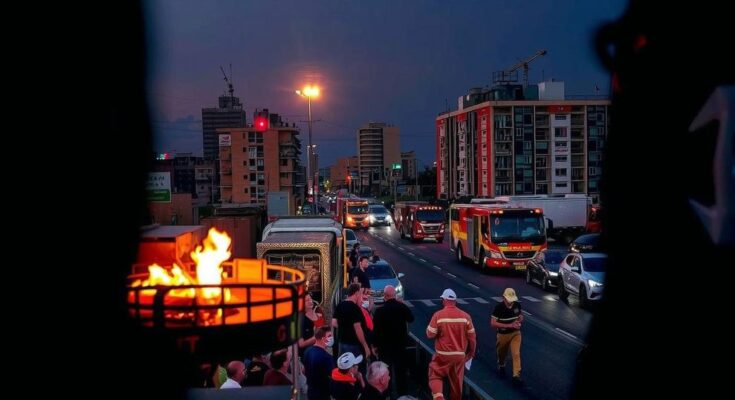Israeli airstrikes in northern Gaza have killed at least 22 people, mainly women and children, alongside a truck ramming attack near Tel Aviv that injured 35. The conflict, intensifying since early October, is marked by significant civilian casualties and a deteriorating humanitarian situation. Iran’s leadership has commented on the issue, reflecting the overarching tensions in the region, which raise fears of a wider war involving multiple parties.
Recent Israeli airstrikes in northern Gaza have resulted in the deaths of at least 22 individuals, primarily women and children, according to Palestinian officials. This offensive marks the continuation of a campaign that has profoundly affected the already beleaguered population of northern Gaza, which has suffered severe casualties and displacement throughout the ongoing conflict. The Israeli military asserts that the attacks were aimed at militants, emphasizing their commitment to minimizing civilian harm. Simultaneously, a vehicle attack occurred near Tel Aviv when a truck ran into a bus stop, injuring approximately 35 individuals, underscoring the prevalent violence in the region. The attack has raised concerns regarding security and the ongoing cycle of retaliation between Israelis and Palestinians, particularly in light of the numerous similar incidents that have occurred over the years. Iran’s response to these developments has also been noted, as its supreme leader, Ayatollah Ali Khamenei, described the situation as one not to be exaggerated or downplayed, hinting at Iran’s strategic calculations in the wake of Israeli airstrikes on Iranian military sites. Khamenei stated, “It is up to the authorities to determine how to convey the power and will of the Iranian people to the Israeli regime and to take actions that serve the interests of this nation and country.” The regional tension is palpable, with fears of a potential escalation into a broader conflict that could involve other militant groups and countries in the vicinity. According to the International Committee of the Red Cross, the humanitarian situation remains catastrophic, particularly in northern Gaza, where residents are facing dire circumstances without adequate access to medical care or basic necessities. As ongoing military operations continue, the death toll for Palestinians has reportedly surpassed 42,000, with the majority being non-combatants. The humanitarian crisis, intertwined with the violence, has created an urgent need for intervention and support for those affected by this protracted conflict. In summary, the violence in Gaza, exemplified by the latest Israeli airstrikes and the vehicle attack in Tel Aviv, reflects the complex and precarious state of safety and humanitarian conditions in the region. Efforts must be made to alleviate the suffering and provide aid to those gravely impacted by the conflict, while the international community remains vigilant regarding the potential for further escalation.
The Israeli-Palestinian conflict has a long and troubled history, characterized by cycles of violence and retaliatory actions from both sides. The latest escalation began following a surprise attack by Hamas on October 7, 2023, which resulted in significant Israeli casualties and prompted a vigorous military response from Israel. In the ensuing weeks, violence has surged, affecting civilians on both sides, with reports of extensive causalities, particularly in Gaza. Additionally, tensions have grown in the region with Iranian involvement and its direct responses to Israeli military actions, complicating diplomatic and humanitarian efforts during this sensitive time. The situation is further exacerbated by the ongoing displacement of residents within Gaza and the catastrophic humanitarian conditions as aid restrictions are tightened, drawing global humanitarian concern.
In summary, the recent escalation of violence between Israel and Gaza, along with the vehicle attack in Tel Aviv, illustrates the precarious state of security and humanitarian conditions in the region. The impact has been particularly severe for civilians, and international agencies continue to call for urgent humanitarian assistance. As both military actions and retaliations persist, the risk of a broader conflict grows, necessitating a concerted effort from the international community to mediate a resolution and alleviate the humanitarian crisis.
Original Source: apnews.com




